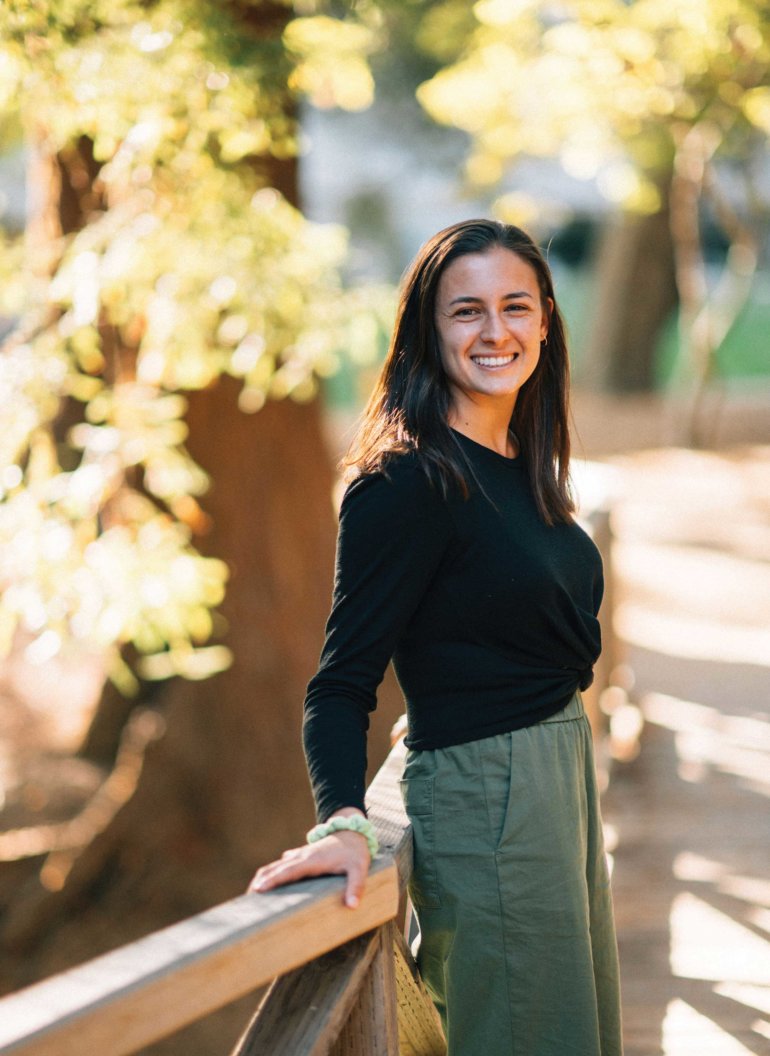Growing up in Hawai‘i, Mackenzie Feldman ’14 was interested in sustainability but never imagined it as a career – then the unexpected happened; She founded a national movement to ban cancer-causing herbicides from school campuses; landed the backing of Re:wild, a global nonprofit protecting and restoring the wild; and is pursuing a graduate degree in sustainable agriculture. It’s safe to say that sustainability now plays a central role in Feldman’s life.
“When I’m speaking to students, I tell them if they don’t know what they want to do, start with something small, because we never set out to create this national organization, it just sort of happened,” Feldman says. “If you’re doing something you care about that’s good for the world, the path just unfolds. So, it feels good to have seen this come so far and to inspire other students to go out and change the world in their own ways.”
Her path began at the University of California, Berkeley, where she was recruited to play beach volleyball. Before practice one day, her coach warned the team to stay out of some grass sprayed with a weed killer. Concerned, Feldman and a teammate asked the athletic grounds manager to stop spraying the toxic chemical where they played. He didn’t have the staff to pick the weeds, but if the team wanted to do it, he would stop spraying. “Great,” Feldman said. “We have 19 girls on our team. We will pick the weeds.”
The win led to a ban of the herbicide around Berkeley’s beach volleyball courts – and bolstered Feldman’s can-do attitude. “It’s surprising how much you can get done when you come at a problem with a solution,” she says. When Feldman graduated in 2018, Berkeley’s entire campus was making the transition away from using synthetic herbicides and fertilizers, and it’s now 95% organic.
That same year, Feldman gained the support of California school groundskeeper Lee Johnson, who won a historic lawsuit against agrochemical titan, Monsanto Company (now known as Bayer), for failing to warn of the carcinogenic dangers of Roundup, a popular weedkiller that uses glyphosate as an active ingredient. In partnership with the Protect Our Keiki Coalition, she invited Johnson to Hawai‘i where he was instrumental in persuading Hawai‘i’s Board of Education to ban herbicides at all public schools.
During that time, university students across the country were reaching out to her in hopes of learning how they too could get herbicides banned at their schools. Seizing the opportunity, she formalized her Berkeley-based initiative into the nonprofit Herbicide-Free Campus.
With a team of seven young women, including Feldman’s former volleyball teammate, the nonprofit has mentored over 70 students from over 50 high schools, colleges and universities across the country, including Princeton, the University of Wisconsin-Madison and Grinnell College, as part of their fellowship program. All-together, Feldman and her team has been able to ban the use of glyphosate from all 10 University of California schools.
“We give advocates tools to work with groundskeepers to convert as many acres as possible to organic and eventually eliminate all synthetic herbicides and fertilizers,” Feldman says. “It sometimes takes multiple years to make it happen, but in the meantime, we empower students to make changes in any way they can, whatever they do after they graduate.” She hopes her initiative will gain even more momentum now that Re:wild – a global nonprofit, founded by conservation scientists and Leonardo DiCaprio – is helping to sponsor her efforts.
Under the new banner, Feldman has rebranded her program Re:wild Your Campus. She hopes the initiative will be able to reach a larger audience and have a greater impact towards improving soil health, adding native and edible plants, increasing biodiversity and eliminating herbicides on campuses. Despite being under the Re:wild umbrella, Re:wild Your Campus will remain as a financially independent organization.
Feldman is now enrolled at University of Texas Rio Grande Valley in the agricultural, environmental and sustainability sciences master’s program with the hope of expanding her efforts into agriculture. If campuses succeed in making their grounds free from harmful herbicides, “hopefully it can have ripple effects in cities and pressure the Environmental Protection Agency to have stricter regulations to protect farmworkers and communities living near farms,” she says.
In a similar vein, Feldman and her mother, recently published “Groundbakers: 60+ Plant-Based Comfort Food Recipes and 16 Leaders Changing the Food System.” Five years in the making, the book lends insight into industrial farming and fishing, land access and soil health, and includes interviews with nationally recognized chefs, community leaders and farmers that Feldman has gotten to know over the years, including Alice Waters, José Andrés, Bryant Terry and Leah Penniman.
A native Hawaiian, Feldman eventually plans to bring all her knowledge back to Hawai‘i to help create a more sustainable food system. “It’s a good avenue because everybody eats, and so it’s something that we should all care about,” she said.

